Praise the True God – Translating Psalm 115
This psalm was full of repetition, and contrast. The unknown psalmist finds themself living in a world that worships idols. Being surrounded by idol worshipers that don’t know God leads the psalmist to reflect on their relationship with, and promises from the Lord.
Psalm 115
Praise the True God
1Not to us, Lord, not to us, †
but to your name give the glory, *
because of your mercy, and your truth.
2Why do the nations say, *
"Where is their God?"
3But our God is in heaven, *
and he does whatever he wants.
4Their idols are of silver and gold, *
the work of human hands.
5They have mouths yet cannot speak, *
eyes yet cannot see,
6ears yet cannot hear, *
noses yet cannot smell.
7They have hands yet cannot touch, †
feet yet cannot walk, *
and only silence comes from their throats.
8The artisans who create idols will become like them, *
along with all whose faith is in them.
9People of Israel, trust in the Lord; *
he is their help and shield.
10House of Aaron, trust in the Lord; *
he is their help and shield.
11All who fear him, trust in the Lord; *
he is their help and shield.
12The Lord remembers us *
and will bless us;
he will bless the People of Israel, *
he will bless the House of Aaron.
13He will bless those who fear the Lord, *
the small with the great.
14May the Lord increase your blessings, *
to you and all your children.
15May you be blessed by the Lord, *
maker of heaven and earth.
16The heavens are the heavens of the Lord, *
but the earth He has given all children.
17The dead do not praise the Lord, *
nor do any who descend into silence.
18But us, we will bless the Lord, *
in this moment and forever.
Praise the Lord.
There was a lot of repetition in this psalm which does make the art of translating the text easier. Though this does introduce challenges. Do you structure the these repeating parts to start with the object of the phrase or not? Within Hebrew poetry there is a strong preference for repetition. You can see this in the early parts of Genesis (On the First Day, On the Second Day, etc.) and we should do well to preserve this for the reader.
Shaming the Idols
After a quick introduction of proclaiming the Lord deserves the glory we get to the issue that has troubled the psalmist. Other nations are mocking and taunting Israel because there God cannot be seen. This leads the psalmist to proclaim that God is in Heaven and is contrasted to idols made by human hands.
The first batch of repetition appears with the repeating of ‘yet cannot’ (ἔχουσιν καὶ – וְלֹא). This conjunction could also be rendered as ‘and’ or ‘but’ as other translations have done. I have chosen the term yet in reference back to their creation. They have added these features to their idols, yet they don’t work. Yet has a sense of progression of time to it that I find helps attach each of these phrases to verse 4 (Their idols… the work of human hands.). Additionally we have chosen to exclude the repetition of ‘They have’. This does render verse 6 very weird if removed from context (ears yet cannot year, noses yet cannot smell), but you should keep texts in their textual context!
This set of repetition ends with the fact that these idols cannot speak. There are a lot of various renderings of this idea that the throat does not speak. As it is the climax of this repetitious set it felt appropriate to add some drama here. The psalmist is finishing their shaming of foreign idols and I wanted us to do better than mimic the previous pattern (throats yet they do not speak). The author gave us much more than a single verb to chew on here, indicating to me that they have broken their repetitious pattern for emphasis. We have concluded verse 7 with the (devastating) closing line: “only silence comes from their throats.”
Warning to the Artisans
Do not use your artistic powers for evil! Having attended art school (and received a fine arts minor in my undergrad) I can tell you that no artist I’ve known wants to make art for evil people or purposes. In our translation we opted to include artisans as a vocation that created the idols. While the vocation is not included in the Hebrew, Greek, or Latin it allows us to better illustrate the intention of the author. It is the person/people that are creating these works of art that will be the idols. They will become like the very work of their hands, along with all who place their faith in the idol.
Proclaiming their Trust and Hope
From verse 9 through the conclusion of the psalm we have the psalmist reaffirming their trust in the God. They are repeating promises that God has made to his people. Since theirs is not a work of human hands and earthly metals then their God intervenes and provides.
We see the focus on the people of Israel (large group), the house of Aaron (smaller group – a subset of the Priests of Israel), and finally everyone who fears and trusts the Lord (the biggest group. This is not clear in the text, but I enjoy that the psalmist talks about all of Israel, then a small portion, and then goes huge with the last group. This is affirmed by the listing of small and great in v13). This order of groups gets repeated when talking about being blessed by God.
This blessing is not simply for now, but for all times. We see this now and in the future in two different places with; (v14) ‘to you and all your children’, and (v18) ‘in this moment and forever’. There is a wonderful contrast again in verse 4 with verse 15. That instead of being made of silver and gold, God has made heaven and earth.
On the Dead
17The dead do not praise the Lord, *
nor do any who descend into silence.
For most Christians verse 17 is likely troubling. The surrounding context does not allow me to readily understand ‘the dead’ to simply be idol worshipers who have died. It’s been nearly half the psalm since others were mentioned. This is one of those moments where we are confronted with the theology of the time the author wrote this. There was not a functional belief in heaven like we have as Christians today. Even though Heaven appears in this psalm, it could also be translated is sky. For the author; God is simply above and beyond their ability to see, reach, or sense. That when you died you would go down into the silence. There is some evidence that ancient Judaism believed in a silent underworld that all went to after they died (sometimes with the reference Sheol).
Hope for the Future
In the final handful of verses there are three clear signs of hope for the future. We see the author hope for increased blessings for you and your children (v14), that the earth was given to all children (v16, implying future children as well), and finally the last verse.
18But us, we will bless the Lord, *
in this moment and forever.
That they, and all who follow will forever bless the Lord. A claim that a millennium later continues to ring true.
Praise the Lord.
Selecting a Title
This psalm has the Latin title of “Laus Veri Dei” which we translate into English as “Praise the True God”. This is the title that we have gone with for this psalm. It captures the crux of the conflict the psalmist was addressing. What is it that you praise and worship – and idol made by artisans or the true (non-false/non-idol) God in heaven?
Initial Translation Finished 10 April 2021
Notes
Translations for Urban Monastic are open to refinement and improvement. This has been translated. Yet, this is a reminder that no translation is ever complete. Cultures change, languages change, we better understand the source texts and languages, and adapt them as they get used in context. We will continue to refine and enhance our translations. If you are interested in helping, please let us know!
Photo Credit
Paul Prins taken 18 September 2018 at Station Hollands Spoor in Den Haag, Netherlands.


